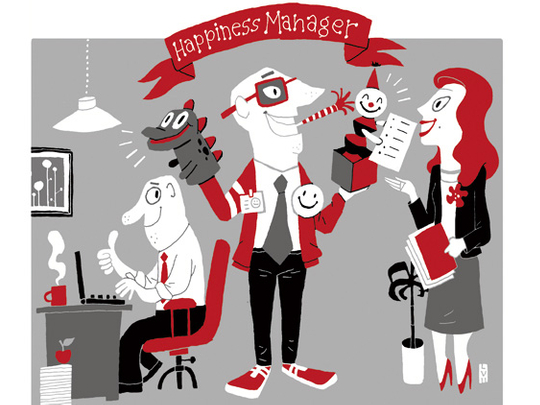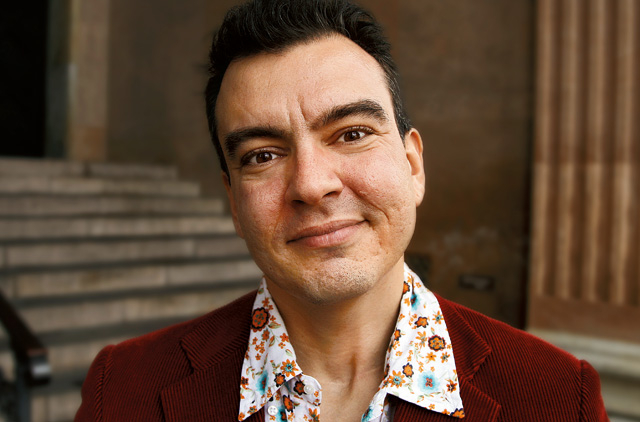
What do you do for a living?" Whenever you meet new people, some variation of this question is bound to come up. When you ask people what they do, most will give you their job title, as in "I'm an engineer" or "I'm a project manager" or consultant, speaker, software developer, manager, contractor, receptionist or… director of first impressions.
Wait a minute. What was the last one? You read it right. Yesterday's front office receptionist is today's director of first impressions. Some companies in the US are calling their receptionist/telephone operators just that. The Rainmaker Group, an employee relations company in North Dakota apparently started the trend. The founder of the company, Chris Young, and his team "help employees find purpose in what they do". One way they accomplish that is by asking employees to think about what their job titles mean.
"If I say, your job title is a phone operator. How would you answer that phone? Like a phone operator. If I say, you're the director of first impressions, you know the way you answer the phone matters. You're going to answer the phone differently," Young says.
He explains his goal is to make employees as effective as possible. "You live your title. Whatever your title is, that's what you'll be." He says his business card carries two titles: founder and difference maker. He doesn't want people to be intimidated by a title like chief executive officer or executive director so he came up with a way to make people laugh and get a sense of what he does. He even signs tax forms for the company as ‘difference maker'.
Alexander Kjerulf, who calls himself the chief happiness officer, agrees. Kjerulf is one of the world's leading experts on happiness at work and the best-selling author of three books including Happy Hour is 9 to 5. He speaks and consults for businesses all over the world, including leading organisations like IBM, Hilton, Lego, HP and Ikea, among others.
"If you tell me your job title on introduction, it does nothing for me," he explains. "It's not what you do - that's just your title. It really says nothing about you or your job, so I always find myself asking follow-up questions like ‘so what kind of projects do you manage?'."
The problem, he says, is that most titles are ambiguous. "Some titles do say what you do. If you're a pilot, you fly planes. Teachers teach. But mostly you end up wasting time with follow-up questions," he says. "Think about it for a moment. How much does your job title really say about what you do? And what would be a better way of telling people what it is you do in just a few words?
Adding value
"Whenever people ask me, I always tell them that ‘I make people happy at work.' That is what I do. This may look like just semantics, but it matters. See, your job title is never going to make you happy at work, but knowing what you do, may. Knowing your contribution, how you add value, how you make a difference - that can make you happy at work."
That this phenomenon is not confined to the US is evident from what Briton Andy Piper bills himself as - social bridge builder. He's a photographer, techie and speaker.
He says, "Increasingly, I'm convinced that corporate job titles are obsolete," he writes in his blog. "Let's face it - in many cases an individual can label themselves with any title, and it may or may not have any meaning either within the context of the organisation, or in comparison to similar companies. The head of a major corporation can be described as CEO, but Joe Normal can be CEO of his own one or two-man company too. It's perfectly valid. Many organisations have champions, evangelists… job titles are morphing.
"I'm frequently asked what I do, as if a title can cover and explain my role in a couple of words. The first answer is that I work for IBM. OK, but that's a very wide field, if you know anything about the company - it could be something in hardware, software, consulting services, research or management. So I was then able to narrow it down by using the word ‘consultant' - one of those titles so broad that it covers all kinds of activities. Then I'd say I'm a software consultant working with WebSphere Integration products for IBM in the UK. But, of course, that wasn't everything I did, if you factored in my social software and virtual-world hats and additional interests.
Recently my formal job title has become even less useful in describing what I do to people outside the organisation."
IBM, he says, "also has a formal professional development careers path linked to The Open Group and British Computer Society - in that, I've moved from being a senior to a consulting IT specialist. Unless you know the structure of the profession, you may not know the difference between senior and consulting levels, or what an IT specialist does in comparison to an IT architect or software engineer or whatever else. ‘consulting IT specialist' is a reasonably useful label, but still doesn't go far enough…
"So if job titles are dead - what now? I'm finding that my personal brand as social bridgebuilder/photographer/ techie is as useful a label or as a starting point for a discussion as anything else. As organisational structures shift and morph into something new, it is becoming more important to maintain a personal brand - linked to a corporate identity - and to be able to explain what you do and can offer in a concise manner. We have to rely on non-traditional ways of presenting oneself through tag clouds and visualisations. All of these things are replacing the job title. Don't tell me your corporate title. Tell me who you are, and what you do."
Predictably, technology companies helped start the trend. For instance, Yahoo! spokesperson Heidi Burgett holds the title Yahoo! evangelist and at America Online, the top honcho of the site's matchmaking service holds the title CEO of love. But over the years such titles have trickled down to the corporate mainstream.
However, the world of job titles in this region, and in the UAE, hasn't changed much in the last 50 years. Is there a reason for that? "Most of the titles [in these parts] are very much business oriented," says Mishal Kanoo, deputy chairman of the Kanoo Group. "You'll have manager, managing director, accountant and so on. The reason is because we have a legacy from the British, and we still follow it for whatever reason. In recent times we have had a few of the American titles pop in these parts like CEO, CFO, CIO (chief information officer), CMO (chief marketing officer) and so on.
"I don't think a title actually says much about the person other than as an initial introduction to the person, the role the person plays in the company. I think we put too much emphasis on titles. My title is deputy chairman, but I sincerely doubt whether I actually fulfil the role, because the deputy chairman usually is a non-executive position, or even if he's an executive, a second-in-command person. I think the things I do are closer to that ofa CEO. However, some job titles carry a social status; they can open doors for you."
Alexander McNabb, group account director at Spot On Public Relations, feels it may be because we are more conservative in this region. "Perhaps because there's more of a culture of respect ingrained in the GCC, perhaps because companies here tend to be a little more traditional. We've seen lots of new job titles as a result of the explosion of online and social media, though - from online conversationalist through search marketing specialist to UX consultant!"
Issues of ego
Kanoo feels that it could also be that the titles we have been working with all these decades are ego-pleasing, so we want to sound important and retain them. "When a person says my name is so and so, the first question we ask is what do you do? Because we want to know what are the connections the person has that will benefit us. That's how titles play a role in social as well as business circles, because we are always trying to understand and gauge [the person's worth]."
"It's funny, isn't it? People still set enormous store by job titles and in this increasingly flat world I think they matter less and less as we have other means of assessing people's reputations and capabilities," says McNabb.
"The problem is when people get all fancy with something that should be simple. What do you prefer: journalist or editorial content specialist?"
Would he like to be a director of last impressions? "No, the very thought makes me shudder!" he says. "It just sounds phoney and silly. I would hesitate to do business with a company that was so obviously trying too hard. It's great to be different, but actually being different in how you operate is what matters, not slapping silly labels on people. And there is, by the way, a great deal more honour to a functional title like ‘receptionist' than a made-up one like director of first impressions!"
He is glad he has had fewer encounters with fancy titles. "I have come across relatively few potty acronyms or titles, so I must be blessed," he says. "My own title is director, which I have always disliked mildly as I rarely get to direct anything around here. I'm just the old man they all laugh at…"
Kanoo for all his seeming conservatism would like to try an innovative title too: "I'd love to be called chief thought officer or chief ideas officer. The idea is to be able to come up with different creative things."
However, for many people giving themselves a creative or wacky title seems to be the equivalent of redefining themselves. Kjerulf says that a reader of his blog, Matt Cardwell, used to be the web marketing director at a company called Quicken Loans. But not any more. "He came across a post of mine… and was inspired to kill off all the traditional job titles," says Kjerulf. Cardwell explained it like this in an email to employees: "If you are concerned about someone not recognising how important you are because you no longer have a standard title, then here's your chance to create a title for yourself that will convey exactly how important you are. And because you are creating it, it will be all yours. No one else will have that title. Think of the conversations your new title will start with complete strangers. Think of the opportunities it can create for you in terms of expressing who you are, not what someone calls you. Here's your chance. You have until the end of the day to let us all know who you are. Have fun, be creative, be humorous, but above all, be real and true."
"At the end of the day, Matt was no longer the web marketing director. he's now the idea salesman, energy focuser and people unleasher," says Kjeulf. Some of the new titles his staff came up with were: royal storyteller and propaganda minister, innovation maven and revenue raiser, mastermind of possibilities and visual linguist.
Is that pure corn? Chris Young doesn't think so. "It lightens the spirit and gets people thinking," he says. "It's not a job description, it's a state of mind."
By the way …
There could be a downside to embracing these non-traditional job titles. "What really matters is what you do as part of your job, not the fancy title," says Mishal Kanoo, deputy chairman of the Kanoo Group. So, while a ‘chief happiness officer' or a ‘director of first impressions' may well attract attention, set an individual apart and even create a positive image, businessmen like Kanoo feel that most customers would rather get their needs catered to by a conventionally titled staff than get mediocre service from a ‘fun' person with a wacky title. Human relations professionals also advise that non-conventional job titles may turn out to be a liability when looking at future job prospects.
To read Alexander Kjerulf's blogs on workplace issues, go to: http://positivesharing.com. Andy Piper blogs at http://andypiper.co.uk














